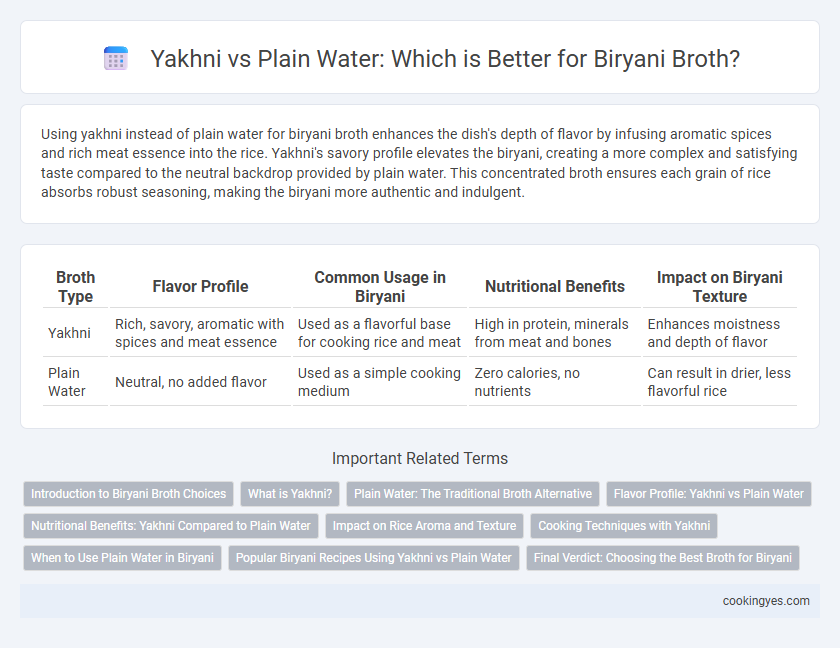Using yakhni instead of plain water for biryani broth enhances the dish's depth of flavor by infusing aromatic spices and rich meat essence into the rice. Yakhni's savory profile elevates the biryani, creating a more complex and satisfying taste compared to the neutral backdrop provided by plain water. This concentrated broth ensures each grain of rice absorbs robust seasoning, making the biryani more authentic and indulgent.
Table of Comparison
| Broth Type | Flavor Profile | Common Usage in Biryani | Nutritional Benefits | Impact on Biryani Texture |
|---|---|---|---|---|
| Yakhni | Rich, savory, aromatic with spices and meat essence | Used as a flavorful base for cooking rice and meat | High in protein, minerals from meat and bones | Enhances moistness and depth of flavor |
| Plain Water | Neutral, no added flavor | Used as a simple cooking medium | Zero calories, no nutrients | Can result in drier, less flavorful rice |
Introduction to Biryani Broth Choices
Biryani broth plays a crucial role in enhancing the dish's rich flavor and aroma, with Yakhni broth offering a spiced, meat-infused base that intensifies the taste profile, while plain water provides a neutral, subtle essence allowing the rice and spices to stand out. Yakhni, traditionally made by simmering meat bones with whole spices, imparts depth and a savory complexity that elevates the biryani's sensory experience. Choosing between Yakhni and plain water impacts the final dish's richness, texture, and authenticity, catering to varying preferences and regional variations in biryani preparation.
What is Yakhni?
Yakhni is a rich, aromatic broth made by simmering meat, bones, and spices, commonly used as the base for biryani to enhance its depth of flavor. Unlike plain water, yakhni infuses the rice and other ingredients with complex savory notes from ingredients like cloves, cinnamon, cardamom, and bay leaves. Incorporating yakhni instead of plain water elevates biryani by adding moisture, aroma, and a layered taste profile essential to authentic South Asian culinary traditions.
Plain Water: The Traditional Broth Alternative
Plain water serves as the traditional broth alternative in biryani preparation, preserving the dish's authentic flavor without additional seasoning. It allows the natural aromas of spices and meat to infuse the rice uniformly, resulting in a balanced taste profile. Using plain water highlights the purity of ingredients, making it a preferred choice for purists seeking genuine biryani.
Flavor Profile: Yakhni vs Plain Water
Yakhni broth, made from slow-simmered meat, bones, and aromatic spices, infuses biryani with rich, deep umami flavors and a complex aromatic profile that enhances every grain of rice. Plain water, lacking these concentrated flavors, results in a milder, less nuanced taste that relies solely on added spices and ingredients for flavor development. Using yakhni elevates the biryani's savory depth and mouthfeel, creating a more robust and satisfying dish.
Nutritional Benefits: Yakhni Compared to Plain Water
Yakhni broth in biryani provides a rich source of proteins, minerals, and collagen extracted from slow-cooked meat and bones, enhancing both flavor and nutritional value. Compared to plain water, yakhni contains essential amino acids, calcium, and gelatin, which support joint health and digestion. Using yakhni instead of plain water elevates the nutrient density of biryani, making it both a savory and health-conscious choice.
Impact on Rice Aroma and Texture
Using yakhni broth in biryani significantly enhances rice aroma by infusing rich, savory notes from slow-cooked meat and spices, creating a deeper flavor profile compared to plain water. The fat and gelatin in yakhni improve rice texture, making grains more tender and moist while preventing dryness. Plain water results in less aromatic rice with a drier, less flavorful texture, missing the complex taste layers essential to traditional biryani.
Cooking Techniques with Yakhni
Using yakhni as the broth for biryani significantly enhances the dish's depth and richness compared to plain water, infusing the rice with concentrated flavors from slow-cooked meat, spices, and aromatics. The cooking technique involves simmering meat and bones with whole spices to extract gelatin and umami, which creates a robust, fragrant stock that tenderizes the rice and meat during layering. This method ensures each grain absorbs the spiced essence, resulting in a moist, flavorful biryani with complex layers of taste and texture.
When to Use Plain Water in Biryani
Plain water is ideal for biryani broth when aiming for a lighter, more neutral base that allows the spices and meat flavors to stand out without additional richness. It is commonly used in vegetable or lightly spiced biryani varieties where the subtlety of ingredients is preferred. Using plain water helps maintain the balance of aromas and prevents the dish from becoming overly heavy or oily.
Popular Biryani Recipes Using Yakhni vs Plain Water
Popular biryani recipes using yakhni broth, like Hyderabadi and Lucknowi biryanis, deliver rich, aromatic flavors due to the slow-cooked meat stock infused with spices. Using plain water in dishes such as Kolkata biryani results in a lighter, subtler taste, allowing saffron and other spices to stand out without overwhelming richness. The choice between yakhni and plain water directly impacts the depth, moisture, and overall taste complexity of biryani, with yakhni preferred for its savory intensity in traditional preparations.
Final Verdict: Choosing the Best Broth for Biryani
Yakhni broth, rich in spices and meat essence, enhances biryani with deep, savory flavors that elevate the dish's complexity compared to plain water. Using plain water results in a more neutral base, allowing other ingredients to stand out but lacking the layered taste that yakhni provides. For the best biryani, yakhni broth is preferred due to its ability to infuse rice with aromatic richness and depth, creating a more authentic and flavorful experience.
Yakhni vs Plain Water for Biryani broth Infographic

 cookingyes.com
cookingyes.com